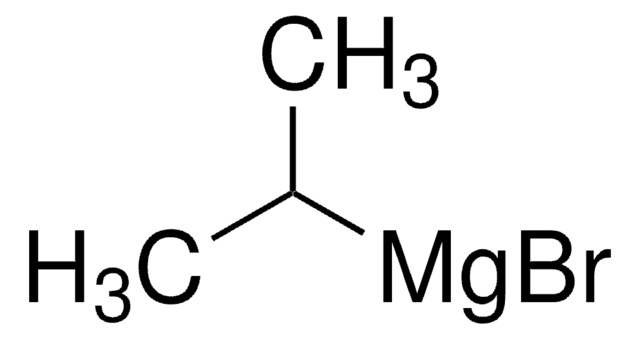189871
Ethylmagnesium bromide solution
3.0 M in diethyl ether
Synonym(s):
EtMgBr solution
About This Item
Recommended Products
Quality Level
reaction suitability
reaction type: Grignard Reaction
concentration
3.0 M in diethyl ether
density
1.02 g/mL at 25 °C
SMILES string
CC[Mg]Br
InChI
1S/C2H5.BrH.Mg/c1-2;;/h1H2,2H3;1H;/q;;+1/p-1
InChI key
TWTWFMUQSOFTRN-UHFFFAOYSA-M
Looking for similar products? Visit Product Comparison Guide
Related Categories
General description
Application
Packaging
Legal Information
Signal Word
Danger
Hazard Statements
Precautionary Statements
Hazard Classifications
Acute Tox. 4 Oral - Eye Dam. 1 - Flam. Liq. 1 - Skin Corr. 1B - STOT SE 3 - Water-react 1
Target Organs
Respiratory system
Supplementary Hazards
Storage Class Code
4.3 - Hazardous materials which set free flammable gases upon contact with water
WGK
WGK 1
Flash Point(F)
-40.0 °F - closed cup
Flash Point(C)
-40 °C - closed cup
Personal Protective Equipment
Regulatory Listings
Regulatory Listings are mainly provided for chemical products. Only limited information can be provided here for non-chemical products. No entry means none of the components are listed. It is the user’s obligation to ensure the safe and legal use of the product.
FSL
Group 3: Spontaneously combustible substances and water- reactive materials
Materials containing Organometallic compounds
Hazardous rank II
2nd spontaneously combustible materials and water reactive materials
ISHL Indicated Name
Substances Subject to be Indicated Names
ISHL Notified Names
Substances Subject to be Notified Names
JAN Code
189871-8L:4548173111988
189871-4X25ML:4548173309071
189871-PZ:
189871-18L-C:
189871-VAR:
189871-BULK:
189871-4X10ML:4548173304571
189871-800ML:4548173111971
189871-100ML:4548173111957
189871-18L:4548173111964
189871-20L:
Choose from one of the most recent versions:
Already Own This Product?
Find documentation for the products that you have recently purchased in the Document Library.
Customers Also Viewed
Our team of scientists has experience in all areas of research including Life Science, Material Science, Chemical Synthesis, Chromatography, Analytical and many others.
Contact Technical Service














